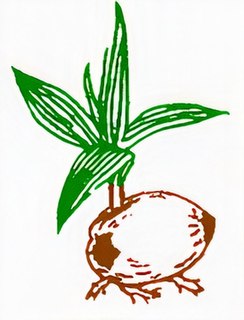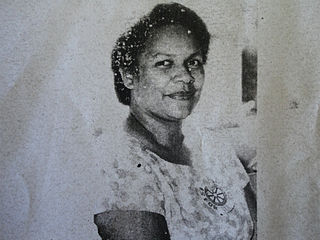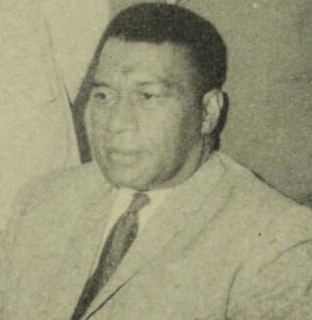Related Research Articles

Mahendra Pal Chaudhry is a Fijian politician and the leader of the Fiji Labour Party. Following a historic election in which he defeated the long-time former leader, Sitiveni Rabuka, the former trade union leader became Fiji's first Indo-Fijian Prime Minister on 19 May 1999, but exactly one year later, on 19 May 2000 he and most of his Cabinet were taken hostage by coup leader George Speight, in the Fiji coup of 2000. Unable to exercise his duties, he and his ministers were sacked by President Ratu Sir Kamisese Mara on 27 May; Mara intended to assume emergency powers himself but was himself deposed by the military leader, Commodore Frank Bainimarama.

The Fiji Labour Party (FLP), also known as Fiji Labour, is a political party in Fiji. Most of its support is from the Indo-Fijian community, although it is officially multiracial and its first leader was an indigenous Fijian, Dr. Timoci Bavadra. The party has been elected to power twice, with Timoci Bavadra and Mahendra Chaudhry becoming prime minister in 1987 and 1999 respectively. On both occasions, the resulting government was rapidly overthrown by a coup.
Siddiq Moidin Koya was a Fijian Indian politician, Statesman and Opposition leader. He succeeded to the leadership of the mostly Indo-Fijian National Federation Party (NFP) on the death of the party's founder, A. D. Patel, in October 1969, remaining in this post until 1977. He later served a second term as leader of the NFP, from 1984 to 1987.
Sir Vijay Raghubar Singh, KBE was an Indo-Fijian lawyer and politician who held Cabinet office in the 1960s and 1970s. Vijay Singh served in Prime Minister Ratu Sir Kamisese Mara's government in a variety of positions, including Attorney-General, and was president of the Indian Alliance, a division of the ruling Alliance Party. He quit the party in 1979 following disagreement with Alliance leadership and later joined the opposition National Federation Party. Vijay Singh was involved in the restructure of the Fiji sugar industry and was a leading member of the Jaycees movement in Fiji.

Ambalal Dahyabhai Patel, better known as A.D. Patel, was an Indo-Fijian politician, farmers' leader and founder and leader of the National Federation Party. Patel was uncompromisingly committed to a vision of an independent Fiji, with full racial integration. He was one of the first to advocate a republic, an ideal not realized in his lifetime. He also advocated a common voters' roll and opposed the communal franchise that characterized Fijian politics.
Ayodhya Prasad Sharma was an Indo-Fijian farmers' leader and politician. He formed the most successful farmers' union in Fiji and forced the Colonial Sugar Refining Company to make concessions to farmers after 60 years of total control over Fiji's economy. However, other Indo-Fijian leaders formed rival unions and his initial success was not repeated. He also served as a member of the Legislative Council between 1953 and 1959.
Kisan Sangh was the first farmers' union formed in Fiji on 27 November 1937. This was the result of one man's determination to improve the plight of Fiji's Indian cane farmers. Ayodhya Prasad had arrived from India in 1929, and after a stint as a teacher took up cane farming and thus obtained firsthand experience of the problems faced by Fiji Indian cane farmers.
Akhil Fiji Krishak Maha Sangh was a sugar cane farmers' union formed on 15 June 1941 in opposition to the existing union, the Kisan Sangh. Supporters of Kisan Sangh tried to stop the formation of the Maha Sangh but were unsuccessful. The people responsible for the formation of a second sugar cane farmers' union were A. D. Patel and Swami Rudrananda. The union was supported by the South Indian sugar cane farmers in Fiji.
The Federation of Cane Growers was formed as an umbrella organisation to negotiate the new cane contract due to take effect from 1960 with the Colonial Sugar Refining Company.
The National Farmers Union' (NFU) is one of Fiji's largest trade unions. It was launched in Labasa in July 1978 under the auspices of the Fiji Trades Union Congress, with Mahendra Chaudhry as its first General Secretary. The union was initially based in Vanua Levu but gradually extended its operations to Viti Levu.
Krishna Samy Reddy was a Fiji Indian school teacher, leader of a farmers' union and both a nominated and elected member of the Legislative Council. Although he started his political career as an ally of A. D. Patel, disputes over the leadership style of A. D. Patel led to a split within the farmers' union that they both led and later they became members of opposing political parties. After independence, he was elected to the House of Representatives as an Alliance member and also served as an assistant minister.
The Citizens Federation was the political expression of a predominantly Indo-Fijian trade union movement, and was a forerunner of the present day National Federation Party.
Jagannath Sami has been a soccer player representing a premier district side in the Fiji Football Association competitions, a leader of the sugar mill workers, a leader of a farmers' union, a politician and chief executive officer of the Sugar Cane Growers Council of Fiji but he is best known for the controversy surrounding his dismissal as the CEO of the SCGC by the military regime of Commodore Josaia Voreqe (Frank) Bainimarama following the military coup of 2006.
The Fiji Cane Growers Association (FCGA) is a cane farmers' union established in 1992 by supporters of the National Federation Party (NFP).
Jain Kumar is a Fijian civil servant and former politician of Indian descent. He was elected the Chairman of Sugar Cane Growers Council of Fiji on 19 January 2007. He replaced Vijendra Autar who had been sacked by the military together with Jagannath Sami and eight board members appointed by the deposed government.
Jai Shree Gawander is a Fijian civil servant and former politician of Indian descent. He was appointed the chief executive officer of the Sugar Cane Growers Council on 31 March 2007. He was previously a member of the House of Representatives and research manager at the Sugarcane Research Centre in Lautoka, Fiji.
Muthu Swamy is a Fiji Indian politician who won the Labasa Indian Communal Constituency, one of the 19 seats reserved for Fiji citizens of Indian origin, for the Fiji Labour Party during the 1999 elections for the House of Representatives.
The People's Charter for Change, Peace and Progress was a proposed legal document which would have complemented the 1997 Constitution of Fiji. It would have established compulsory guidelines for any government policy in Fiji over the coming years. The People's Charter was due to be completed and come into force prior to the scheduled 2014 general election.

Adi Losalini Raravuya Dovi was a Fijian politician and lady of rank in Fiji's chiefly leadership. In 1966 she was jointly one of the first women elected to parliament, serving in the House of Representatives until 1977. She also served as Assistant Minister for Urban Development and Social Welfare from 1975 to 1977.

Ratu Napolioni Naulia Dawai was a Fijian chief and politician. He served as a member of the Senate and House of Representatives from 1970 to 1986.
References
- ↑ "Fiji Sun – Sugar Cane Growers Council" . Retrieved 2019-08-20.
- ↑ "NFU wins cane growers polls | FIJI Labour Party" . Retrieved 2019-08-20.
- ↑ Lal, Brij V. (2011-11-01). A Vision for Change: AD Patel and the Politics of Fiji. ANU E Press. ISBN 9781921666599.
- ↑ Lal, Brij V. (2006-08-01). Islands of Turmoil: Elections and Politics in Fiji. ANU E Press. ISBN 9781920942755.
- ↑ "Army regime can't sack me, says Sami". Fiji Times. December 27, 2006.
- ↑ "Former Labour MP is new SCGC CEO". Fijilive. 31 March 2007.
- ↑ "SCGC appointments criticized". Fiji Village. 31 March 2007.
- ↑ http://www.matavuvale.com/forum/topics/back-to-democracy-for-fiji?commentId=2150904%3AComment%3A1675556 Matavuvale Network